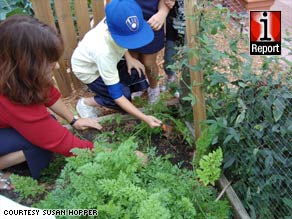(CNN) -- As American families try to stretch their food budgets during the recession, some are turning to the backyard, rather than the grocery store, as the place to look for produce.

Susan Hopper of Tampa, Florida, uses her garden to teach her students where food comes from.
Recession gardens are catching on with many first-time planters who want a healthy meal at an affordable price.
The gardeners are following seed-strewn paths laid by Michelle Obama and Eleanor Roosevelt, both of whom have used the White House lawn to show the value of a garden during tough times.
The scope of today's trend is shocking even to those in the gardening industry.
W. Atlee Burpee & Co., the largest seed and gardening supply store in the country, says it has seen a 25 to 30 percent spike in vegetable seed and plant sales this spring compared with last.
"I've been in the business for 30 years, and I've never seen anything like it -- even remotely like it," said George Ball, chairman and CEO of the company.
In 2008, there was a 15 to 20 percent uptick in seed sales because of high food and gasoline prices. Not since the '70s, when the company saw sales increases in the 10 percent range, has gardening seen such buzz, he said.
The National Gardening Association expects 43 million American households to grow their own fruits, vegetables, herbs and berries this year. That's up 19 percent over last year, according to a 2,559-household survey the group conducted in January.


1 comentario:
La práctica de sembrar huertos familiares y urbanos ha cobrado fuerza en Estados Unidos no solo como actividad recreativa, sino como estrategia práctica para enfrentar los crecientes costos de los alimentos y favorecer la autosuficiencia alimentaria, especialmente entre familias que sienten la presión del alza de precios y buscan reducir gastos domésticos.
Publicar un comentario